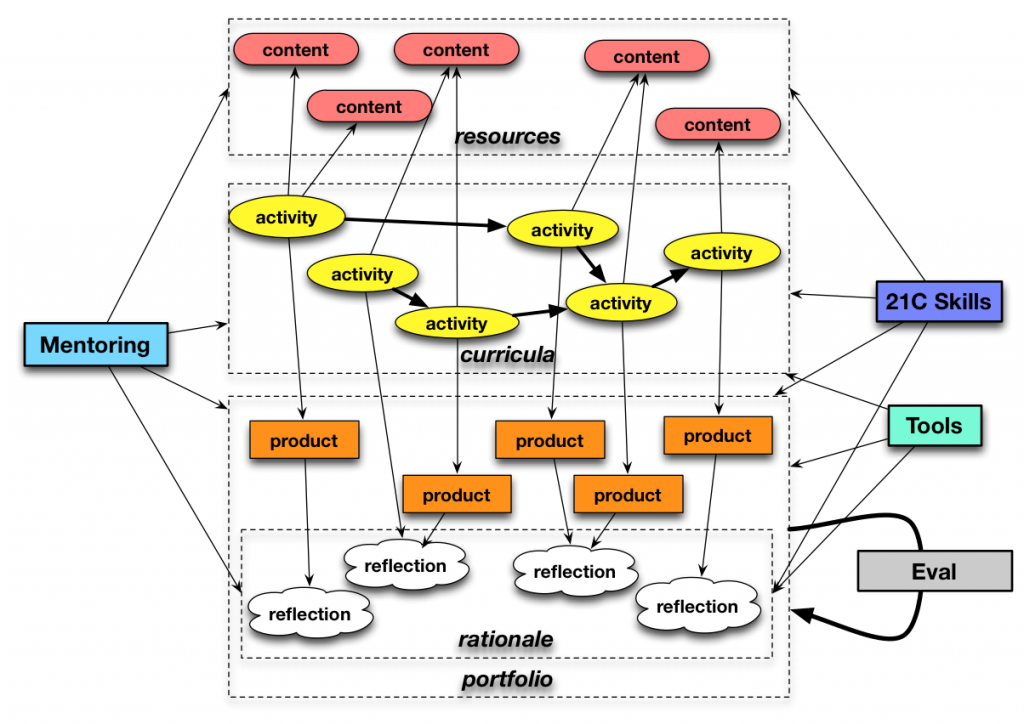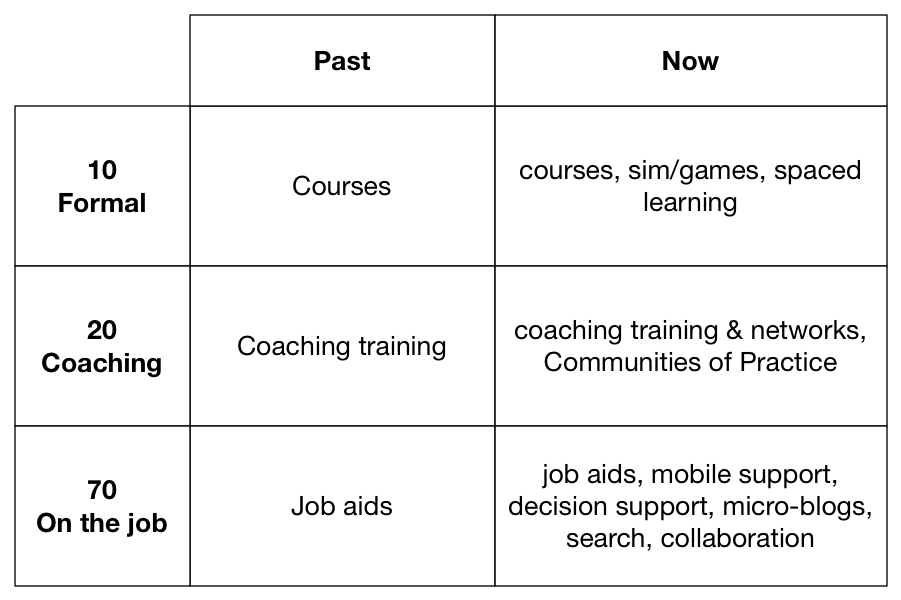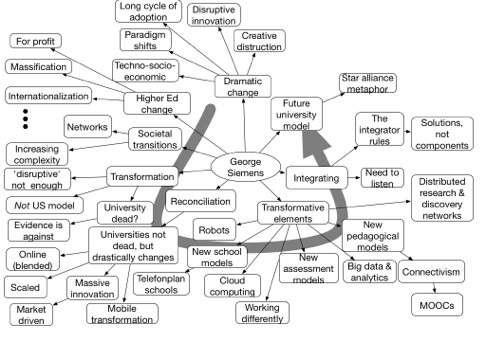George Siemens kicked off the EDGEX conference with a broad reaching and insightful review of the changes in higher education.
Archives for March 2012
Reimagining Learning
On the way to the recent Up To All Of Us unconference (#utaou), I hadn’t planned a personal agenda. However, I was going through the diagrams that I’d created on my iPad, and discovered one that I’d frankly forgotten. Which was nice, because it allowed me to review it with fresh eyes, and it resonated. And I decided to put it out at the event to get feedback. Let me talk you through it, because I welcome your feedback too.
Up front, let me state at least part of the motivation. I’m trying to capture rethinking about education or formal learning. I’m tired of anything that allows folks to think knowledge dump and test is going to lead to meaningful change. I’m also trying to ‘think out loud’ for myself. And start getting more concrete about learning experience design.
 Let me start with the second row from the top. I want to start thinking about a learning experience as a series of activities, not a progression of content. These can be a rich suite of things: engagement with a simulation, a group project, a museum visit, an interview, anything you might choose for an individual to engage in to further their learning. And, yes, it can include traditional things: e.g. read this chapter.
Let me start with the second row from the top. I want to start thinking about a learning experience as a series of activities, not a progression of content. These can be a rich suite of things: engagement with a simulation, a group project, a museum visit, an interview, anything you might choose for an individual to engage in to further their learning. And, yes, it can include traditional things: e.g. read this chapter.
This, by the way, has a direct relation to Project Tin Can, a proposal to supersede SCORM, allowing a greater variety of activities: Actor – Verb – Object, or I – did – this. (For all I can recall, the origin of the diagram may have been an attempt to place Tin Can in a broad context!)
Around these activities, there are a couple of things. For one, content is accessed on the basis of the activities, not the other way around. Also, the activities produce products, and also reflections.
For the activities to be maximally valuable, they should produce output. A sim use could produce a track of the learner’s exploration. A group project could provide a documented solution, or a concept-expression video or performance. An interview could produce an audio recording. These products are portfolio items, going forward, and assessable items. The assessment could be self, peer, or mentor.
However, in the context of ‘make your thinking visible’ (aka ‘show your work’), there should also be reflections or cognitive annotations. The underlying thinking needs to be visible for inspection. This is also part of your portfolio, and assessable. This is where, however, the opportunity to really recognize where the learner is, or is not, getting the content, and detect opportunities for assistance.
The learner is driven to content resources (audios, videos, documents, etc) by meaningful activity. This in opposition to the notion that content dump happens before meaningful action. However, prior activities can ensure that learners are prepared to engage in the new activities.
The content could be pre-chosen, or the learners could be scaffolded in choosing appropriate materials. The latter is an opportunity for meta-learning. Similarly, the choice of product could be determined, or up to learner/group choice, and again an opportunity for learning cross-project skills. Helping learners create useful reflections is valuable (I recall guiding honours students to take credit for the work they’d done; they were blind to much of the own hard work they had put in!).
When I presented this to the groups, there were several questions asked via post-its on the picture I hand-drew. Let me address them here:
What scale are you thinking about?
This unpacks. What goes into activity design is a whole separate area. And learning experience design may well play a role beneath this level. However, the granularity of the activities is at issue. I think about this at several scales, from an individual lesson plan to a full curriculum. The choice of evaluation should be competency-based, assessed by rubrics, even jointly designed ones. There is a lot of depth that is linked to this.
How does this differ from a traditional performance-based learning model?
I hadn’t heard of performance-based learning. Looking it up, there seems considerable overlap. Also with outcome-based learning, problem-based learning, or service learning, and similarly Understanding By Design. It may not be more, I haven’t yet done the side-by-side. It’s scaling it up , and arguably a different lens, and maybe more, or not. Still, I’m trying to carry it to more places, and help provide ways to think anew about instruction and formal education.
An interesting aside, for me, is that this does segue to informal learning. That is, you, as an adult, choose certain activities to continue to develop your ability in certain areas. Taking this framework provides a reference for learners to take control of their own learning, and develop their ability to be better learners. Or so I would think, if done right. Imagine the right side of the diagram moving from mentor to learner control.
How much is algorithmic?
That really depends. Let me answer that in conjunction with this other comment:
Make a convert of this type of process out of a non-tech traditional process and tell that story…
I can’t do that now, but one of the attendees suggested this sounded a lot like what she did in traditional design education. The point is that this framework is independent of technology. You could be assigning studio and classroom and community projects, and getting back write-ups, performances, and more. No digital tech involved.
There are definite ways in which technology can assist: providing tools for content search, and product and reflection generation, but this is not about technology. You could be algorithmic in choosing from a suite of activities by a set of rules governing recommendations based upon learner performance, content available, etc. You could also be algorithmic in programming some feedback around tech-traversal. But that’s definitely not where I’m going right now.
Similarly, I’m going to answer two other questions together:
How can I look at the path others take? and How can I see how I am doing?
The portfolio is really the answer. You should be getting feedback on your products, and seeing others’ feedback (within limits). This is definitely not intended to be individual, but instead hopefully it could be in a group, or at least some of the activities would be (e.g. communing on blog posts, participating in a discussion forum, etc). In a tech-mediated environment, you could see others’ (anonymized) paths, access your feedback, and see traces of other’s trajectories.
The real question is: is this formulation useful? Does it give you a new and useful way of thinking about designing learning, and supporting learning?
70:20:10 Tech
At the recent Up To All Of Us event (#utaou), someone asked about the 70:20:10 model. As you might expect, I mentioned that it’s a framework for thinking about supporting people at work, but it also occurred to me that there might be a reason folks have not addressed the 90, because, in the past, there might have been little that they could do. But that’s changed.
In the past, other than courses, there was little at could be done except providing courses on how to coach, and making job aids. The technology wasn’t advanced enough. But that’s changed.
 What has changed are several things. One is the rise of social networking tools: blogs, micro-blogs, wikis, and more. The other is the rise of mobile. Together, we can be supporting the 90 in fairly rich ways.
What has changed are several things. One is the rise of social networking tools: blogs, micro-blogs, wikis, and more. The other is the rise of mobile. Together, we can be supporting the 90 in fairly rich ways.
For the 20, coaching and mentoring, we can start delivering that wherever needed, via mobile. Learners can ask for, or even be provided, support more closely tied to their performance situations regardless of location. We can also have a richer suite of coaching and mentoring happening through Communities of Practice, where anyone can be a coach or mentor, and be developed in those roles, too. Learner activity can be tracked, as well, leaving traces for later review.
For the 70, we can first of all start providing rich job aids wherever and whenever, including a suite of troubleshooting information and even interactive wizards. We also can have help on tap freed of barriers of time and distance. We can look up information as well, if our portals are well-designed. And we can find people to help, whether information or collaboration.
The point is that we no longer have limits in the support we can provide, so we should stop having limits in the help we *do* provide.
Yes, other reasons could still also be that folks in the L&D unit know how to do courses, so that’s their hammer making everything look like a nail, or they don’t see it as their responsibility (to which I respond “Who else? Are you going to leave it to IT? Operations?”). That *has* to change. We can, and should, do more. Are you?
#LearningStyles Awareness Day review
I want to support David Kelly’s Learning Styles Awareness Day, but have written pretty much all I want to say on the matter. In short, yes, learners differ. And, as a conversation with someone reminded me, it helps for learners to look at how they learn, so as to find ways to optimize their chances for success. Yet:
There’s no psychometrically-valid learning styles assessment out there.
There’s no evidence that adapting learning to learning styles is of use.
So what to do?
Use the best learning you can (at the end of the video).
Then help learners accommodate.
Here’re my previous thoughts, developing towards a proposal for how to consider learning styles, in chronological order:
Learning Styles, Brain-Based Learning, and Daniel Willingham
My problem with learning styles really is the people flogging them without a) acknowledging the problems, and b) appropriately limiting the inferences. Sometimes it seems like playing ‘whack-a-mole’…
